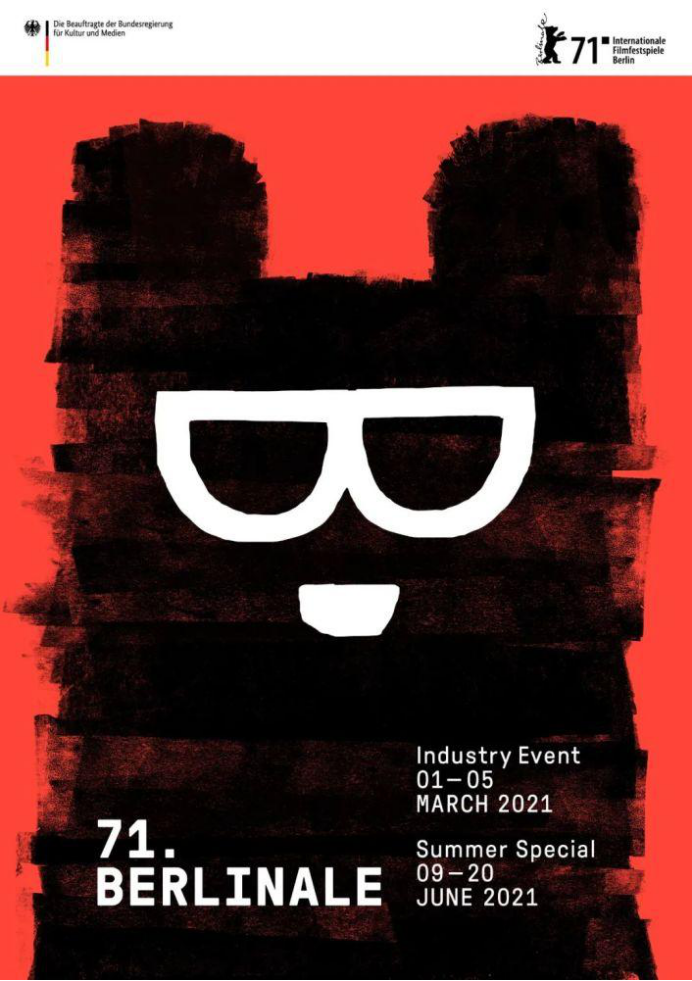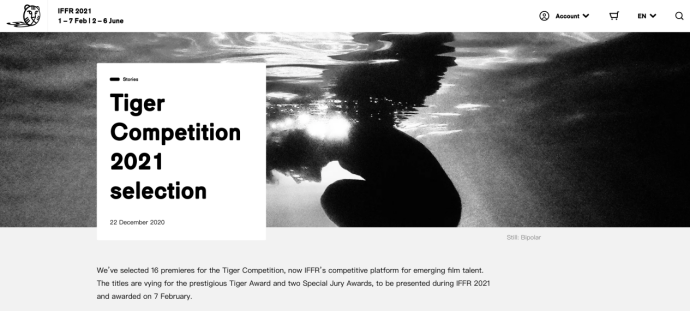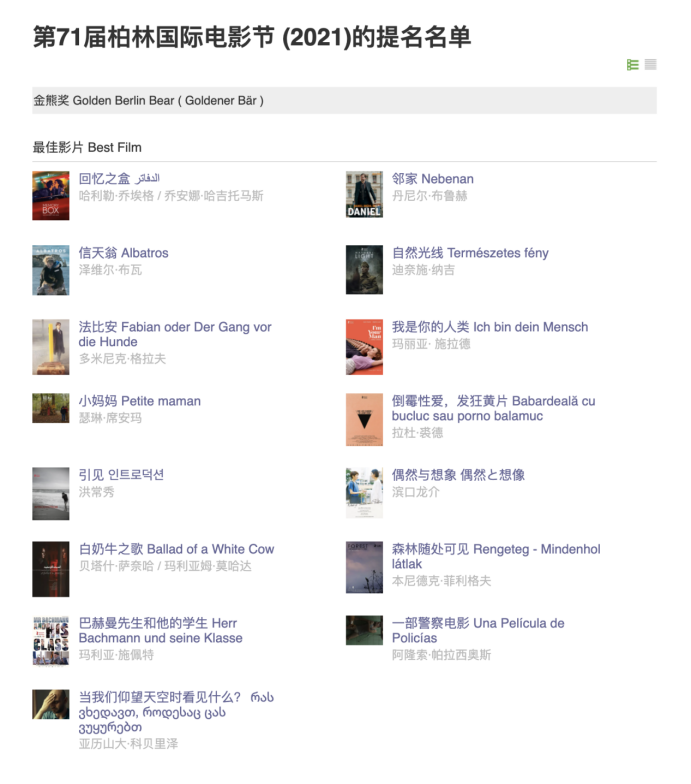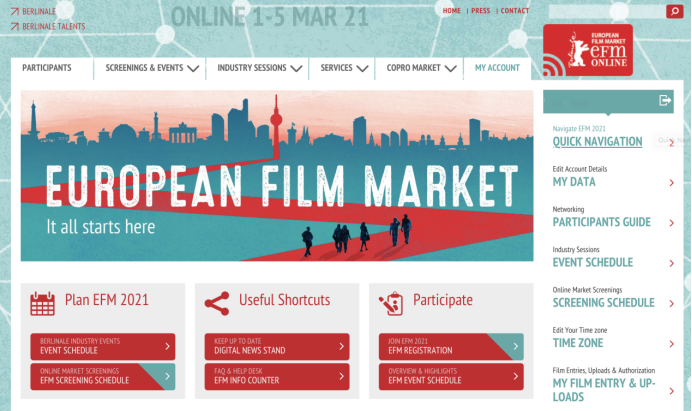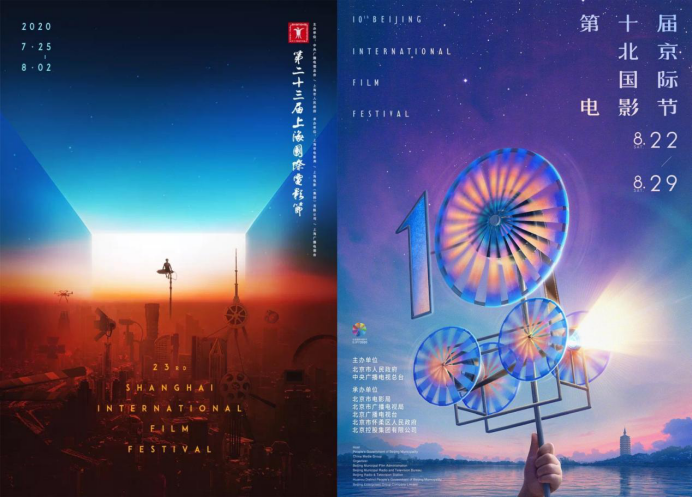The first online Berlin Film Festival in history is not over yet, and I am already looking forward to Cannes this year. “Making a movie together.” This article comes from the public micro-channel number (ID:: yiqipaidianying)
Editor’s Note, Author: No idea.
This year’s Berlin Film Festival is more “low-key” than ever.
On March 1st (Monday), the online screening of the 71st Berlin Film Festival kicked off quietly. In previous years, the Berlin Film Festival was held at the end of February, about the same time as the Oscars. Although the schedules are somewhat collided, there is still a clear difference in the positioning of the two. The former heralds the start of the new year’s European Film Festival journey, while the latter just announces the end of the awards season of the past year.
However, due to the impact of the epidemic, major international film festivals around the world have had to adjust their strategies, postpone or simply switch to the front line, Oscars have been postponed to the end of April. In this case, this year’s Berlin Film Festival has also become the latest and shortest time in history. The online screening will only take five days from March 1st to 5th. Although the festival organizers have repeatedly emphasized that this online screening is only part of this year’s Berlin Film Festival, when the epidemic improves in June, offline screenings will definitely be reopened to bring the film back to the audience. However, the division of the content and format of the film festival still makes it impossible to recapture the grand occasions of the past international category A film festivals.
▲ The official poster of the 71st Berlin Film Festival
Yesterday, the Chinese film “Wisdom Teeth”, which was shortlisted for the Berlin Special Screening Unit, had its online world premiere, and its reputation was small. This is probably the biggest hot spot in the Chinese film circle at this year’s Berlin Film Festival.
With the successful holding of Sundance and Rotterdam at the beginning of the year, and now the online screening in Berlin is coming to an end, what changes and development trends will other film festivals have in the coming year? In particular, can Cannes, which everyone cares about most, be held in July this year?
To this end, Pai sir interviewed several scholars and media professionals who often participated in domestic and foreign film festivals, and chatted with them about the overall development trend of this year’s global film festivals.
Sundance, Rotterdam: The battlefield has moved to the online, offline screenings to return
Let’s start with Sundance at the beginning of this year.
This year’s Sundance will be held from January 28 to February 3, due toAffected by the epidemic, it was delayed a few days compared to previous years. In addition to offline screenings in Park City, Utah, this year’s Sundance also moved most of its programs online. Although the scale of the selection has been reduced and the duration has been shortened accordingly, this year’s Sundance still set a number of records.
This year’s biggest winner comes from the female director Xia’an Hyde’s “Hearing Girl”, which not only won four awards in the American drama unit-Jury Award, Best Director, Audience Award and Jury Group Drama Special Award, which was also bought by Apple at a high price of US$25 million, setting a record for the Sundance Film Festival. To be sure, this movie will also be mentioned repeatedly in the awards season of the second half of this year.
Not only that, but the epidemic has also brought unexpected effects. According to statistics, this year’s Sundance online and offline movie viewing activities held in 20 cities in the United States, the total number of viewers has reached 2.7 times that of previous movie viewing activities. Although there are only 73 feature films screened this year, which is a significant reduction compared to the past, the organizers of the Sundance Film Festival estimate that their films have been screened more than 500,000 times. This allowed the film festival organizers to further consider the new normal of online and offline integration in the future.
Still in the current epidemic situation, offline activities and screenings are difficult to achieve. Major film festivals and exhibitions are looking for ways to develop online platforms. However, due to the huge impact of the epidemic on the film and television industry worldwide, the industry has been shut down and the number of new films has dropped sharply. Therefore, how to present an attractive program list and grab more resources and users from other film festivals and streaming media giants has become a problem that every film festival has to consider.
After Sundance, the Rotterdam International Film Festival, which is seamlessly connected with it, also has similar troubles.
This year is the 50th edition of the Rotterdam International Film Festival. If there is no epidemic, I will definitely plan a series of corresponding activities. But nowadays, the film festival can only be held in two stages, online and offline. The online screening has been held from February 1st to the 7th, while the offline part will have to wait until the return of early June this year (6.2-4).
▲ 2021 Rotterdam Film Festival Golden Tiger Award Main Competition Selection
From the perspective of the division of units, this year’s Rotterdam includes the Golden Tiger Award competition unit, the big screen competition unit, the short film competition unit and the Limelight screening unit, and the popular “Bright Future Award” selection (Bright Future Award) in the past It was cancelled this year. Although the duration of the week has been shortened compared to previous years, in fact, judging from the number of selected films in the main competition unit of the Golden Tiger Awards, it is actually more than in previous sessions.
Yinxiang, a scholar who has participated in many Rotterdam Film Festivals, told the filming sir that from his observation, this kind of “expanding the scale of selection” is more like a “retro behavior”, because as early as 5 or 6 years ago, The Golden Tiger Award actually maintains the number of selections of about 13-16 films. Until 2016, the number of Golden Tiger Award competitions was controlled to less than 10. And this year, I returned to 16 again, probably because during the epidemic, I wanted to support and encourage more directors as much as possible, so the number has increased again.
In addition, on the 18th of last month, Rotterdam also launched an online retrospective called “IFFR Unleashed” (IFFR Unleashed: 50/50). In this exhibition, one film is selected from each of the previous programs for concentrated screening. A total of four Chinese films are shortlisted, namely: Chen Kaige’s “Yellow Earth” (1986), Hu Jinquan’s “Chivalrous Girl” (1995), Cai Mingliang “Persistent” (2004), and the short film “Wong Ping’s Fables (2)” directed by Huang Ping (2020).
In short, for this year’s Rotterdam, Yinxiang believes that the overall quality of Rotterdam’s consistent selection of films is still guaranteed. Avant-garde and avant-garde films are supported by niche authors. Online viewing also saves some time costs such as queuing up in the past. . “I’m a person who doesn’t value the viewing experience so much. Most of the unpopular films or the avant-garde works actually look good online. But for those works that focus on the audiovisual experience, such as 3D, VR and sound For a film with a very particular design, the online environment must be very limited.”
“However,” he added, “Affected by the epidemic, this year’s Rotterdam also has some regrets. For example, the absence of the “Future Light” unit and the suspension of the Asian Film Awards (Netpac Award) are invisible. Make the past AsiaThe film’s route to Europe through Rotterdam was cut off. For example, in previous years, there may be some Korean films that will go through the local Busan Film Festival (in October each year), then to Rotterdam (in February of the following year), and finally to Berlin, Cannes or other larger European film festivals. , Under the epidemic, this road was cut off. Other countries like Iran, the Philippines and other Asian countries have this situation. “
When will it get better? Yinxiang believes that it may be necessary to wait until the overall epidemic situation in Europe is under control and the scope of vaccination is as wide as possible before it is possible to restore normal exchanges between film festivals. But no one knows exactly how it will develop.
Berlin: The scale of the competition is reduced, and the online screening is well received
Cannes: I will definitely do it! “The strongest in history”?
As of today, there is only one day left for the online screening of the Berlin Film Festival tomorrow. In the past four days, this year’s Berlin Film Festival has been a bit “low-key” or even “desolate”. But compared to the Sundance and Rotterdam mentioned above, Berlin, the old-brand A film festival, still received a certain amount of discussion.
A total of 15 films were selected in this year’s Berlin main competition. This number has decreased compared to usual (18 films last year). At the same time, among the shortlisted directors, with the exception of Hong Changxiu, Hamaguchi Ryusuke, Celine Sianma, and Radu Jude and other directors who have a certain reputation among movie fans, most of the rest are some. A director whom everyone knows little about before, and has never even heard of it. Moreover, among these 15 films, only one-third of the films were produced or participated in the production in Germany, and no Chinese films and Hollywood films were shortlisted.
▲ The 71st Berlin Film Festival’s main competition for the Golden Bear Award
When we talked about the overall selection of films in Berlin this year, the media person Jialuo analyzed his views with us.
First of all, the online screening part of the film festival only lasts for 5 days, mainly because the online screening was only open to the film market at the beginning, and all film festival markets, whether Berlin or Cannes, last for 5 days, but Offline activities basically last about 10 days. Moreover, the film festival officials have repeatedly emphasized that offline activities will return in June this year, which will be the real “offline premiere” moments for these films, and they may be screened at that time.The duration will remain stable at around 10 days as usual.
Secondly, judging from the scale of selection, this time the number of films in the main competition has decreased, partly because of the epidemic, and new clips are available; on the other hand, to a large extent, it is also that many directors are unwilling to make their films online World premieres are held on online or streaming media platforms, so they would rather wait until the next epidemic improves and go to other offline category A film festivals such as Locarno or Venice. There are red carpets and stars, as well as a large amount of media exposure, etc. Wait.
Gyro said: “For many directors who have already achieved fame, they may not need the title of the Berlin A Film Festival. The offline premiere may be more pursued. So this year’s main competition film, you can see There are many new directors that people didn’t pay much attention to in the past. This is also because big directors are unwilling to come, and these new talents need more support and encouragement from the title of Berlin.”
▲ Stills of Hong Changxiu’s new film “Introduction”, which was shortlisted for the main competition in Berlin
“Of course,” he added, “Since they have chosen to come to Berlin, it means that these directors will leave the offline’international premiere’ rights to Berlin by default, which means that from March to June , These films will not use streaming media or other distribution channels.”
Although the volume of this year’s Berlin Film Festival is not as good as before, on the whole, based on long-term observation and understanding of domestic and foreign film festivals, the top still gives a good evaluation.
“I really like this new director,” said Gyro. “I think he has a very clear positioning of the Berlin Film Festival. It’s not as mainstream as Cannes, nor is it getting closer and closer like Venice and Hollywood, such as Like last year, he selected the main competition film list, not only the mainstream masters in the conventional sense, but also some more avant-garde films that are more well-known in the movie fan circle. And he put the newly founded “Encounters” (Encounters) The unit is positioned in the style of Locarno, and it can be said to have achieved a better balance.”
“This year, because of the epidemic, global film festivals are so difficult. He still saves such a’plate’. There are many such works in the film list that blur the boundaries of plot and documentary. There are also works like Hong Changxiu and Hamaguchi Ryusuke. The author and director of, this is great. Like this year’s main competition unit, besides the title of’Competition 2021′, doesn’t it have a subtitle, called’Resha’Law tolerates the fact that Berlin and Venice have been absent for two years in a row, and this is a complete blow to them. What’s more, now everyone is not as panicked about the epidemic as it was at the beginning. Therefore, it will definitely be done. As for the specific form, further observation may be needed.
Why Cannes has always been so resistant to the format of online film festivals? This is largely consistent with Cannes’s attitude towards streaming media like Netflix. In the minds of an idealist like Fumao, the cinematic experience cannot be replaced, especially in France, the birthplace of film, in Cannes, the highest hall of art cinema in the world. Cannes is able to reach its present position, to some extent, it is inseparable from the idealistic “paranoid” attitude of Fumao. In his opinion, there are only two possibilities for Cannes: holding it offline, or not.
▲ Fu Mao (picture from the Internet)
This is why, many people regard the success of Cannes this year as a positive signal. After all, in Europe and the United States today, the epidemic is still severe, the industry is sluggish, and streaming media has further exacerbated the demise of cinema chains. At this time, if Cannes, which has always stood on the opposite side of online streaming media, can be successfully held offline, this will undoubtedly bring strong confidence to the entire industry and basically announce the smooth return of cinema viewing behavior.
No matter what, everyone is looking forward to this year’s Cannes. Gyro also said that although there may be a series of restrictions such as anti-epidemic policies, Cannes this year will still be the most star-studded in recent years. After all, the world’s masterpieces that have been accumulated for two years are estimated to be gathered here, and I feel blessed just thinking about it. “(Main competition) It is estimated that there will be about 24 or 25. The number may be the largest one. Of course, the weight is the strongest, and it is estimated that there will be Chinese films.”
Major domestic film festivals: two lines parallel, volume expansion, competition return
For this online screening in Berlin, many practitioners interviewed by sir almost all gave quite positive comments.
The curator of the New York Chinese Film Festival Huang Yue told sir that online and offline forms have always been combined, and Berlin is not setting a precedent. However, in the two stages of Berlin this time, the online part is mainly aimed at the film market, and it is convenient for the judges to judge awards. But in fact, as early as last year, many film festivals were already onlineThe online and offline activities were carried out at the same time, such as last year’s New York Film Festival, Toronto Film Festival and so on.
Before the epidemic is fully controlled, the combination of online and offline may become a new trend in film festivals in the future, especially abroad. From an objective point of view, online has its unique convenience, but at the same time, the satisfaction of the movie-watching experience, the development of film festival-related activities, and the sense of ritual participation in various activities are incomparable with offline .
▲ The online European Film Market (EFM)/Screenings page of this year’s Berlin Film Festival
In addition, almost all interviewees mentioned that the epidemic has another impact on the overall situation of global film festivals, which is the chaos in the schedule of global film festivals.
Sundance, Rotterdam, and Berlin have all been postponed to varying degrees. Now Cannes has also been postponed to July, and Fumao even said that it would not rule out the possibility of postponing until autumn. If this is the case, all major film festivals in Cannes, Venice, and even Locarno, San Sebastian, Toronto, and Busan will be held in August and October. “Thinking about it, it feels terrible.” Top said with a smile, “but it does not rule out that some small film festivals will be held in groups.”
The collision of the film festival schedules will inevitably lead to disputes in the selection of films. In the past, a film may have a fixed film festival distribution route. For example, first go to the three major European film festivals to gain a reputation, then go to other category A film festivals to show a solid position, and finally return to the local theater for distribution. But now, once the film festival schedules collide, the priority of choice and the reputation of the film festival are even more important for the director and film crew. Even if you want to go to Cannes, that is not realistic, after all, Cannes is already full.
Fortunately, the same problem is not expected to appear at this year’s domestic film festivals, and the overall format of the film festival is not expected to change too much.
Last year, Shanghai Film Festival and Beijing Film Festival have been postponed to varying degrees, and the scale has also been reduced. The successful holding of FIRST Film Festival, Pingyao Film Festival, and Hainan Island Film Festival is also a prerequisite for the development of the epidemic to stabilize under. However, due to the spread of overseas epidemics, whether it is the scale of the film or the interaction between filmmakers, it is more helpless than before.
▲ The official poster of Shanghai Film Festival/North Film Festival in 2020
In comparison, China is indeed the most advanced place for global epidemic control. The film industry is actively resuming work, and this year’s Spring Festival box office has reached a record high. This not only adds confidence to domestic filmmakers, but also sets a good example for filmmakers in other countries.
Therefore, with the normalization of epidemic prevention work and the further promotion of vaccines, it is estimated that this year’s domestic film festivals will be held smoothly as scheduled, and last year’s Shanghai Film Festival and Beijing Film Festival have adopted online and offline viewing. The combination method is expected to continue this year.
So, on this basis, what adjustments and innovations will there be?
First of all, the major domestic film festivals have returned to normal times, and the film and television industry continues to operate normally. According to the calendar of previous film festivals, the Hong Kong International Film Festival and Beijing Film Festival in April, Shanghai Film Festival in June, FIRST Film Festival in July, Pingyao Film Festival in October, Golden Horse in November, Hainan Film Festival in December, in this order For many films released by film festivals, it is still a relatively benign publicity route. The film list will also be announced in Hong Kong on the 9th of this month. Those who are interested may wish to check it out.
Secondly, given the better control of the epidemic, the scale of this year’s film festival may also be further liberalized. Take the above festival as an example. Last year, more than 300 films were screened, and from 2017 to 2019, there were more than 500 films in the exhibition every year. Not surprisingly, this year’s Shanghai Film Festival will return to more than 400 screens. The North Film Festival also strictly controlled the number of film selections and the scale of the screening last year. A unit called “Focus on the Future” that sir liked was also cancelled. I hope to see its return this year.
At the same time, with the reopening of overseas navigation, it will be possible for foreign filmmakers to come to China to participate in film festival exchanges, provided that they are willing to undergo multiple nucleic acid tests and lengthy quarantine. Of course, if the epidemic had been controlled on a large scale by then, that would be great. In this way, the jury will return, film awards, offline forums, film markets, and venture capital conferences will also return one by one.
